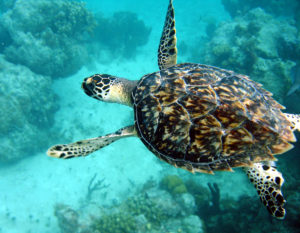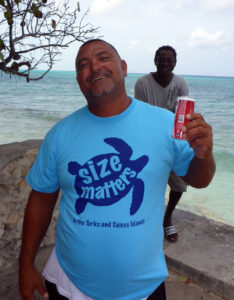Green and hawksbill turtles face a brighter future
Changing hearts, changing legislation

Green and hawksbill turtles face a brighter future in the Caribbean where we’ve had some resounding success in the Turks and Caicos Islands (TCI).
Fishing and eating turtles in many places is still legal, despite many species, including the hawksbill, being critically endangered. Changing legislation to ensure all turtles that are fished are done so sustainably has been the prime focus for our team on the ground.
Tracking turtles
For legislation to be effective, local fishermen need to be fully involved and supportive. Tagging and naming several turtles proved a great way to get everyone interested. Suzie, an adult green turtle, surprised everyone by taking an epic 6,000km trip. But it was the three male and one female hawksbill turtle, tracked for many months, never leaving TCI waters, that really hit home. Understanding that these turtles were resident to the Islands helped many fishermen realise their responsibility to protect the turtles.
Size Matters

Using their findings about turtle behaviour and demonstrating the support of the local fishermen, the team was able to draft legislation to put to the TCI Government Minister of the Environment. The suggestions were all agreed and are now enshrined in law – an amazing result. There’s now closed a season when fishing of certain turtle species is banned. Minimum size limits of turtles that can be landed have been set and maximum size limits too, to protect large breeding adults. This incredible project demonstrates just how much conservation progress can be made when working with the communities involved.
